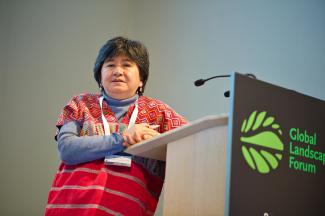
Countless Indigenous Peoples have been divided by imposed State borders, their communities and relatives separated by artificial lines, their migration patterns, sacred rituals, fishing and hunting ways altered. Innumerable Indigenous communities have suffered forced displacement due to conservation efforts, extractive industry operations, political strife, and the impacts of climate change. Every day we hear about Indigenous migrants who are forced to leave their home in search of work because it is no longer viable for them to make a living locally. They flee violence; they flee because they can no longer provide for their families, because their resources are depleted or polluted by large scale agribusiness. To tackle migration and immigration issues, we must reverse the impacts of colonization, decades of neoliberal policies, and the current operations of extractive industries, agro companies, and monocropping that have impoverished Indigenous communities. We must respect, protect, and fulfill Indigenous rights, encouraging the decolonization and support of home communities with sustainable economic opportunities so that people do not have to leave. The following are a few Indigenous voices on these issues. We invite you to listen. To hear the full interviews, visit: cs.org/rights.
Joan Carling (Kankanaey from the Philippines), Indigenous Peoples Major Group for Sustainable Development Convenor
The continuing out-migration of Indigenous Peoples from their lands, territories, and resources is actually an alarming trend now. The issue of land grabbing [and resulting displacement] is one major factor that has to be stopped. Another is the increasing incidence of natural disasters because of climate change. More and more Indigenous Peoples are driven away because of the impact of these kinds of disasters; we are becoming victims to these disasters without even contributing to the climate crisis. Another reason is militarization and conflicts in Indigenous territories. How can children go to school if there’s always fighting in their areas? How can we do our traditional livelihoods? There is also the economic condition of Indigenous Peoples, who increasingly cannot provide for their families because their lands are taken away. Out-migration, particularly because of economic reasons, is making Indigenous women and children more vulnerable to abuse because their social network is not there anymore and they’re not familiar with the social environment that they’re getting into.
In terms of youth, that is already quite a worry. We need to put in place an environment where the youth will stay in their communities. We need them to have access to education in their own communities so that they don’t have to leave to study in urban centers, far away from their families and their people, and to encourage them to come back and use whatever they’ve learned to help their own people. In the case of Indonesia, there is a clear program encouraging youth to go back to their communities. This has proven effective, and one of the means that they have done this through is the use of technology.
[We need to] provide security and support for Indigenous Peoples in their own areas for their sustainable development so that they remain in their communities. We need support to be able to sustain the way we manage our resources and provide livelihoods and for people to be self-reliant so that they don’t have to go looking for jobs. This means we need to take care of the specific needs and aspirations of Indigenous women. We also need to account for the situation of persons with disabilities in our communities. We need to develop a holistic approach to sustainable development of Indigenous Peoples from their perspective and generate the kind of support that is needed. If we do that, we’re contributing to the sustainable development of the wider society because we are protecting the resources needed for future generations.
There are different types of border issues. The Karen community was split between Myanmar and Thailand, and they cannot self-govern in the way that they did before. Since neither country recognizes their rights, families and clans of Karen are separated because of this border. We also see that all over India, where the Tripuri were split between Bangladesh and India. Now both the governments of Bangladesh and India are putting non-Indigenous people in these areas, which is causing more problems instead of resolving the issue. Where I come from, my town has a boundary dispute with the next village. The decision was to agree that we don’t have to demarcate the boundary and to agree that both villages can use the area without drawing the line. It’s more important for both peoples to have peaceful coexistence rather than have a conflict. At the end of the day, it’s the protection of our territories on a wider level that is more important. As long as we live by the values of Indigenous Peoples of solidarity, cooperation, and upholding the common good, that should be the framework of resolving these kinds of boundary issues in a peaceful manner.
It is time for the world to listen to Indigenous Peoples because we have so much to offer. We have been protecting our planet and we have positive values in the way we govern ourselves; those values are what we need at this stage. What we need is to uphold the common interest. We need transparency. And we need to care for each other, especially those most in need. Having reciprocal relations with our environment so we don’t destroy it, this is needed for future generations. These are universal values that have to guide the way to achieving sustainable development.
Photo by Pilar Valbuena, Global Landscape Forum.
